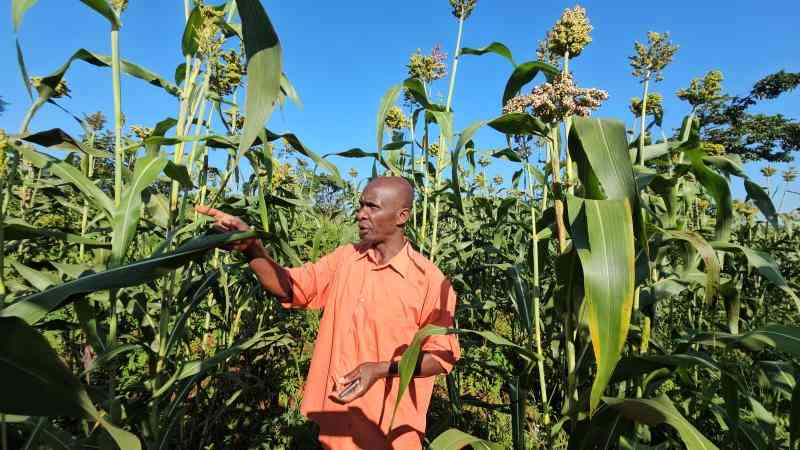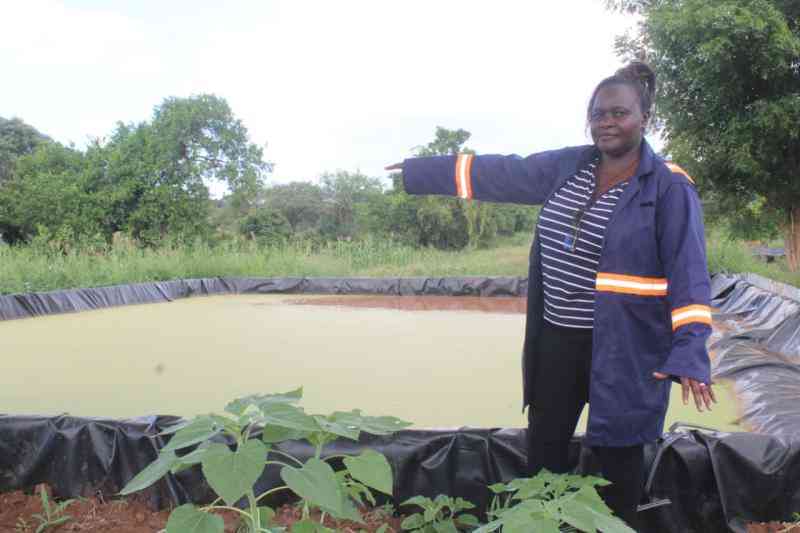
On a Friday mid-morning in Bulimba village, Busia, Jenifer Barasa is busily harvesting her sorghum crop. One by one, she cuts the well-filled grain heads, places them into a traditional tray, and takes them home to dry.
“It has been a promising season,” she says, adding that she anticipates harvesting at least 100 kilogrammes of sorghum from the two varieties.
Barasa is among 511 farmers from Busia and Siaya counties who received new sorghum varieties from the Genetic Resources Research Institute (GeRRI), a semi-autonomous institute under the Kenya Agricultural and Livestock Research Organisation (Kalro).
In February 2022, GeRRI distributed seeds of 51 different sorghum varieties to farmers drawn from 26 groups. In what can be termed ‘citizen science,’ farmers and scientists have collaborated in testing and selecting the best varieties for their counties and surrounding areas.
- Rice production gets impetus in a multi-million irrigation project
- Indigenous crops take centre stage in drive to beat climate change
- Pastoralists in arid counties now embrace farming amid climate shocks
- Sweet revolution: Beekeepers change tack for better harvest
Each farmer received three accessions labeled A, B, and C, which they grew to identify the best performers that met their preferences.
“I liked both the A and B varieties as I found them early maturing, high yielding, and not susceptible to bird attack,” says Barasa.
Having started with just a few grammes of seeds from each variety, she has multiplied her yield to approximately 50 kilos of each, judging from her anticipated harvest.
In addition to planting the seeds on her own farm, Barasa shared some with four other farmers, as encouraged by researchers from GeRRI. These ‘second-generation’ beneficiaries of the new varieties are also multiplying their preferred sorghum seeds on their farms. This farmer-to-farmer seed exchange ensures that more farmers benefit from the seeds and enhances sustainability.
At Matayos village, Ferdinard Oleso is monitoring the growth and performance of his sorghum farm. “I expect a bumper harvest,” he says, observing the size of the heads and the amount of grain.
Previously, he admired his neighbor’s sorghum crop and requested seeds to grow in his own fields.
“I received a cupful of seeds for variety B from my neighbor Sylvester Chami, who was among the first beneficiaries of the seed provided by GeRRI,” Oleso shares. “Since I had been admiring Chami’s farm, as a good neighbor, he gladly shared the seeds.”
From his own observations, he notes that the variety he received is not only higher-yielding but also largely unaffected by birds—unlike those he had previously grown. Bird attacks present significant challenges in sorghum production, and GeRRI has addressed this by providing red and brown sorghum varieties, which are less susceptible to bird damage.
In partnership with Rongo University, Maseno University, and Seed Savers Network, GeRRI has been implementing the Seeds for Resilience (SFR) project. This initiative, coordinated by the Crop Trust and funded by the German government via the German Development Bank (KfW), aims to share seeds with farmers to enhance the diversity available in farming communities and improve resilience to climate change.
In addition to Kenya, the SFR project is also being undertaken in Ethiopia, Ghana, Nigeria, and Zambia. “One major component of this project is to promote the utilization of resources from the gene bank by different users,” says GeRRI Institute Director Dr Desterio Nyamongo. “We selected sorghum and millet as crops whose utilisation we wanted to promote and took them for characterisation.”
Farmers actively participated in the characterisation and selection of seeds, as well as in the subsequent multiplication of these varieties.
According to Dr Peterson Wambugu, Chief Scientist at GeRRI, enhancing food security amid climate change lies in cultivating a diversity of crops and varieties. Research indicates that as climate change continues, varieties with the necessary adaptive capacities for particular areas will likely need to be sourced from other regions.
Gene banks are invaluable in this regard, holding ecotypes collected from various parts of the world. “The challenge researchers face is identifying varieties that meet farmers’ preferences while also adapting to current and future climates,” Dr Wambugu notes.
The National Seed Policy in Kenya is under review to include aspects of the Farmer Managed Seed System (FMSS), often referred to as the informal seed system.


